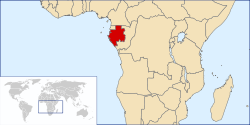Top Qs
Timeline
Chat
Perspective
Geography of Gabon
From Wikipedia, the free encyclopedia
Remove ads
Gabon is a country in Central Africa, lying along the Atlantic Ocean, just south of the Bight of Biafra.
This article needs additional citations for verification. (April 2019) |


Remove ads
Area and borders
- Area
-
- Total: 267,668 km²
- country rank in the world: 76th/77th
- Land: 257,670 km²
- Water: 10,000 km²
- Total: 267,668 km²
- Area comparative
- Australia comparative: approximately 1/6 larger than Victoria
- Canada comparative: approximately 2/3 the size of Newfoundland and Labrador
- United Kingdom comparative: approximately 1/10 larger than the United Kingdom
- United States comparative: slightly smaller than Colorado
- EU comparative: approximately 1/10 smaller than Italy
Gabon has a total of 3,261 km of international boundaries. It borders Equatorial Guinea (335 km) and Cameroon (349 km) to the north and the Republic of the Congo (2,567 km) to the east and south. Gabon lies on the equator.
- Maritime claims
-
- Territorial sea: 12 nmi (22 km)
- Contiguous zone: 24 nmi (44 km)
- Exclusive economic zone: 200 nmi (370 km)
Remove ads
Terrain

Narrow coastal plain with patches of Central African mangroves; hilly interior; savanna in east and south. A recent global remote sensing analysis suggested that there were 420 km2 of tidal flats in Gabon, making it the 50th ranked country in terms of tidal flat area.[1]
- Irrigated land: 44.5 km2 (2003)
- Total renewable water resources: 164 km3 (2011)
Remove ads
Environment
International agreements:
Party to: Biodiversity, Climate Change, Desertification, Endangered Species, Hazardous Wastes, Law of the Sea, Marine Dumping, Ozone Layer Protection, Ship Pollution, Tropical Timber 83, Tropical Timber 94, Wetlands, Whaling
Climate
Summarize
Perspective
The equatorial location of Gabon means that it has a tropical monsoon climate (Köppen Am) and a tropical savanna climate (Köppen Aw), with the temperature being hot year-round and humid, although the Benguela Current can moderate temperatures.
Climate change
Gabon is highly vulnerable to climate change due to its dense coastal population, economic hubs along the shore, and dependence on rain-fed agriculture.[8] Rising sea levels threaten to erode the coastline and contaminate freshwater sources with saltwater. The country is already experiencing more frequent and severe extreme weather events, such as floods, droughts, and storms, which damage infrastructure, displace communities, and disrupt food security and livelihoods.[9]
To adapt, Gabon prioritises protecting its coastal areas, as well as its fishing, agriculture, and forestry industries.[8] Gabon's vast forests act as a net carbon sink.[10][11] It is recognized as a global leader in climate action and is widely considered the most carbon-positive country in the world, due to its strong conservation efforts.[9] However, Gabon’s economy remains heavily dependent on oil and other natural resources, leaving it exposed to global market shifts and climate-related risks. In 2023, the country accounted for just over 0.04% of global greenhouse gas emissions (24.7 million tonnes). Gabon has pledged to stay carbon neutral beyond 2050 and, with adequate support, aims to maintain net carbon removals of 100 million tons CO2 equivalent per year beyond that date.[12] It also seeks to expand its renewable energy sector.[13]
Remove ads
Extreme points
- Northernmost point - unnamed location on the border with Cameroon on the Ntem River, Woleu-Ntem province
- Easternmost point - the unnamed location on the border with the Republic of Congo immediately south-west of the Congolese village of Mbeyi-Mbola, Haut-Ogooué province
- Southernmost point - the point at which the border with the Republic of Congo enters the Atlantic Ocean, Nyanga Province
- Westernmost point - the north-west point of Cape Lopez, Ogooué Maritime province


Remove ads
See also
References
External links
Wikiwand - on
Seamless Wikipedia browsing. On steroids.
Remove ads


